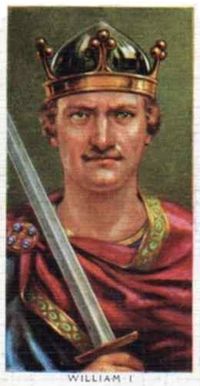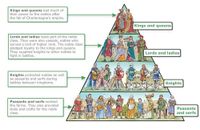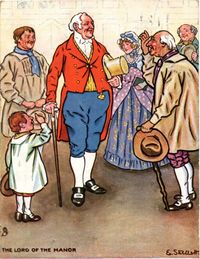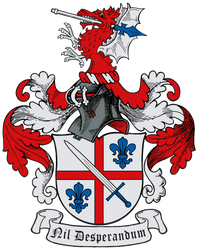Manorial Lordships
Manorial Lordships - Past & Present
Lordships of the Manor titles are arguably the oldest feudal titles in England and still in continuous use. In English society, the Lordship of the Manor is a Lordship originating in the feudal system of manorialism. Historically a Lord of the Manor might be a tenant-in-chief if he held a capital manor directly from the Crown; otherwise he was a mesne Lord if he did not hold directly from the Crown, yet had his own tenants.
The origin of feudal titles goes back into Roman times, when the Roman Empire set up a tax system to fund the central Roman administration. It was remarkably simple and efficient. Instead of taxing people, land was taxed. Because there were so many landowners, one landowner was charged with collecting taxes from all his neighbours. These tax collectors possessed great power and became the first landlords, Latin "seignior". Their appointment was not linked to this title, but developed over time through custom. As English law recognised Common Law the titles were embedded into English Law.
The myth that titles were bestowed dates comes from the time of the Norman Conquest in 1066. William the Conqueror did something unique for England that has never been repeated. He claimed all land as his own. He also never gave any of this land away, but simply granted ongoing leases to people to farm the land. Since these leases were called "seigniories" and were granted to the "seignior", many assume that this was the granting of the title as well as the actual lordship, land and land rights. However, this is not the case; it is merely a conveyance of rights that had existed for hundreds of years before the conquest. This is confirmed by the fact that the Domesday Books which record both the lords after the Conquest and the lords prior the conquest. Following the Norman conquest, land at the manorial level was recorded in the Domesday Book of 1086. Many of these lords owned their lands by possessing them rather than recording them of any paperworks (deeds).
Feudal Hierarchy & Obligations
There are three distinct legal elements to a Manor:
- the Lordship of the Manor or dignity - the title granted by the manor,
- the manorial land - the manor and its land,
- the Seignory (manorial rights) - the rights granted to the holder of the Manor.
To convey all three rights they had to be specifically listed in the deeds of transfer.
The Lordship of the Manor title is a property – in legal terms it is known as an ‘incorporeal hereditament’
Under the laws of real property in the United Kingdom, manorial or feudal Lordships are known as ‘Estates in land’. A feudal Lordship title itself can be separated from the physical property just as any other right can. Titles became separate from the physical land in 1922 and officially a manorial or feudal Lordship title is “a property without body”.
They are in English common law as well as in English property law classified as 'incorporeal hereditaments'. 'Incorporeal' means having no physical presence (not to see, touch or smell). 'Hereditament' means inheritable, a Lordship title can be inherited to the next generation (meaning the right continues forever more).
Through English Custom Law each owner of a Lordship gained the legal right to use the titles of Lord and Lady. This gives the holder the legal right to style him or herself Lord or Lady of the Manor of X, Lord or Lady of X or Lord or Lady X. Historically the feudal Lord has carried with it a bundle of rights over land within the manor, even over land that was in the hands of tenants and common land. Lordship rights varied from Lord to Lord, some of these were included in the grant of the Lordship such as the right of corporal and capital punishment or the 'Right of Gallows' and 'Right of Stocks'. Another important grant of right would be to hold a market within the manor.
Other privileges have included the right to hunt wild animals on the wastes of the manor - common land - and the right to wild fish. The Lord could demand payment from people fishing in rivers and lakes within his manor - common land.
LORD OF THE MANOR
- Title arose in feudal system after Norman Conquest
- Estates of land called manors were still owned by the king
- But they were handed to the (mostly Norman) lords in return for military service
- They were all-powerful over the peasants who worked the land
- Today the holder can call themselves 'The Lord of the Manor of ...' or 'Lord of ...' or just 'Lord ...'
England is almost unique in the world in still having valid Lordship titles which can be bought and sold
Manorial rights are part of English property law and refers to the law of acquisition, sharing and protection of valuable assets in England and Wales. As such they can be bought and sold as other properties. Therefore manorial Lordships can be rightful transferred, conveyed, inherited or sold to other parties. This practice has been common since the medieval times. In addition, they are the only titles that can be legally purchased. Manorial Lordships are ancient titles which relate to land tenure. Lordships of the Manor are neither titles of the peerage of the United Kingdom, nor are they related to the British honours system. Although feudal lordships were once historical noble titles, they now belong to the feudal system, as a form of feudal dignity. Manorial Lordship titles are nonetheless historic artifacts and protected in the 1922 Law of Property Act.
For more information about manorial titles, please visit our The British Titles System page.



%20(180x98).jpg/picture-200?_=18885949051)

